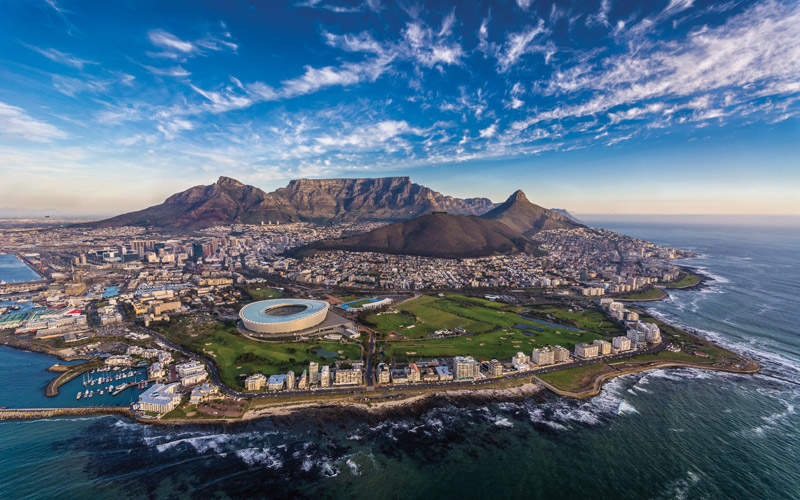Voted coolest street in the world, here’s why
Spirited away
Jorgensen’s distillery, home of handcrafted spirits and green fairies
Enchanting. That’s the word that sticks in my mind as I enter Versailles farm, headquarters of Jorgensen’s Distillery. Not in an over-the-top fairy dust everywhere kind of way, but more of a subtle bewitchment. The Jorgensen’s know how to wiggle into your heart and once they’re there, they stay put.
Meet Roger and Dawn Jorgensen; gatekeepers of handcrafted premium spirits, devoted parents, Wellington locals, travellers, dreamers and damn good hosts. The last time we met here, it was to try South Africa’s first premium vodka, Primitiv. Now they’ve added an absinthe and a limoncello to their range, which already included a potstill brandy. There are also loud rumblings about a gin soon to be released.
We walk through their rambling farm house—a home filled with art, curiosities and books, books, books—to the back patio overlooking a block of chenin blanc vines.
Artisan distillation, a revolution
Soon we’re settled into antique wooden chairs around a table on the patio. Frosty bottles of the Jorgensen’s range are centre stage.
“There were 14 000 distillers in the US before prohibition,” says Roger. He’s passionate about the history of his craft, and is a veritable fount of knowledge and the subject. Clearly a clever guy, he taught himself how to distil; through books, the internet and most amazingly through the thorough tasting and comparing of other premium spirits.
“The little guy disappeared. Artisan distillation was swallowed by the 1800s,” says Roger. “If you wanted booze, you had to make it yourself. After prohibition the big guys consolidated their powers and there were only nine left—it was made illegal to produce artisan liquor.”
Much of the same thing happened here on home soil and Roger was an integral part of the change. “Distillation licences were revoked; stills were filled with concrete, damaged and punctured with holes,” he says. “The right to distil was given to the big corporates. So, having first been bought out, these craft distillers were now locked out.”
“No longer was there a tradition of making fine brandies,” continues Roger. “It was the start of the brandy and coke culture, harsh spirits made to mix. In one stroke of the pen the government got rid of all character and individuality in spirit making.”
In 1994 Roger banded together with other like-minded distillers and started what was called the ‘potstill revolution’. These brave booze-makers challenged their constitutional right to produce artisan liquor and in the end, won their rights back.
This is when Roger started making his potstil brandy, Savingnac, but more about that later. First the Primitiv. Roger pours us icy vodka into chilled glasses, and as if on cue, Dawn walks onto the patio carrying a platter of snacks.
That’s the spirit
“Drinking vodka and eating go hand-in-hand,” says Roger. “You sip the vodka have a bite and think about what you taste. A journey of flavour is what it’s all about.”
On offer are slices of spelt bread topped with smoked trout and faux caviar. “It’s made of seaweed,” say Dawn gesturing at the black dots. “Yes,” chimes in Roger, “it’s no longer fashionable to bash sturgeon on the head and milk them for their eggs.”
Interestingly spelt wheat is also what Primitiv vodka is made of, and is what is known as a relic crop, which means it’s rarely cultivated. The last time I tried the vodka it had a slight vanilla taste. This time, the flavours rush up with aniseed and liquorice.
“Each batch of vodka we make is different,” explains Roger. “As it should be with an artisan product. The flavour comes from the husk of the spelt.”
Next we try the Naked Lemon Limoncello. “They say that only the Italians can produce good limoncello, because of the lemons grown on the Amalfi Coast. But obviously we produce beautiful fruit in this country. I use organic lemons grown on the Perdeskoen.”
Hand-zested lemons are macerated for 12-days to produce this richly yellow liqueur. I spy a green liquid coalescing towards the neck of the bottle and Roger explains to me that the liquid is actually the lemon oils. A natural product indeed.
The bottle of absinthe has my attention. A deep chlorophyll green, it’s called the Field of Dreams. Sketched on the bottle are leaves of botanicals and herbs used in the making. Impressively, they’re all grown on the farm’s property, from the wormwood to the angelica.
There are 15 plants in total that go into this quixotic mixture. Roger pours us a small measure each, anymore would shoot our socks off as it’s 72% proof. At first, I’m not sure what I taste, the alcohol carries the herbs all over my mouth, pinging and ponging like well, a little green fairy.
The mystique of this spirit is what makes it so appealing. Legendary artists, poets and musicians would seek out the elusive green fairy, from Hemmingway to Van Gough. It’s said that the wormwood has psychoactive (hallucinatory) properties, but in such small doses, the effect would rarely be felt.
“In small doses absinthe has the ability to make you more loquacious and contemplative,” muses Roger. “But people tend to behave very badly if they’ve had a few shots.”
Now back to the very beginning, our Cognac glasses are topped with the amber Savingnac. Roger then brings a plate of brownies to the table. “I baked them,” he says. “First have a sip of the brandy, then a bite of the brownie, and then sip again.” We do as instructed and I feel the eyes roll back in my head. The mellow flavour of the brandy undulates on a chocolate wave—rich brown spice, like nutmeg and cinnamon is followed by dense toffee, hazelnut and vanilla.
And the brownies? I’ve never been a fan; I always find them too dry and dense. Roger’s though, I’m gobsmacked, perfectly light and moist in the centre with just enough of a tactile crunch on the base. Good grief, the man can even bake.
By Malu Lambert
Jorgensen's Distillery | Versailles Farm | Regent Street | Wellington | +27 21 864 1777
Tastings by appointment only.
---
Party like a Russian at this festival dedicated to vodka.
---
For your monthly update on what’s happening in and around Cape Town, be sure to subscribe to our popular newsletter and follow us on Facebook and Twitter.








